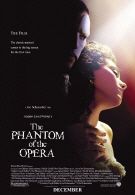Even before it went into production, many aspects of the cinematic version of Andrew Lloyd Webber’s The Phantom of the Opera spelled doom. Everything, from the troubling rumors of John Travolta and Antonio Banderas as the top contenders for the coveted role of the title character to Katie Holmes being turned down for the role of Christine Daae, the female lead in the story, citing her as being, at 26, “too old,” was off-putting. Once production started, the unpromising worsened. There were rumors of drastic changes being made to the classic story (including what seemed an out-of-place swordfight) and the role of Christine, an educated singer/dancer, went to then-17-year-old—17-year-old!—Emmy Rossum. The only glimmer of hope came from the modest budget—believe it or not—an estimated $50 million, which could prevent the excess often associated with the gifted Schumacher.
As a big fan of the Broadway musical (I’ve seen it six times), I had no choice but to be wary, yet ecstatic to see one of the great stage musicals finally arrive on the big screen. With mediocre expectations, Schumacher’s Phantom is a mixed blessing, as dazzling to the eyes and ears as it is numbing to the heart and mind. This is a Schumacher film, because in the end, surface triumphs over soul.
The Phantom of the Opera opens at the Paris Opera-House in the late nineteenth-century, with the production of “Hannibal” (the elephant-tamer, not the face-eater) coming to a halt when its temperamental star, La Carlotta (Minnie Driver, sporting the worst Italian accent since Nicholas Cage in Captain Corelli’s Mandolin), walks out during a dress rehearsal after threats from the mysterious Phantom (Gerard Butler), who has haunted the opera house for years. The theatre’s inexperienced new managers (Ciarán Hinds and Simon Callow) are at a loss, so they replace her with the young ingénue Christine, who has been taking singing lessons from this “opera ghost,” all without ever seeing him, yet believing him to being an “Angel of Music.”
Christine mesmerizes the audience and her new managers and quickly dethrones the arrogant diva, capturing the heart of her unseen tutor, whose facial deformities resulted in him being caged as a freak-show attraction for the first quarter of his life. But she also finds herself the object of affection of a childhood friend, the theatre’s wealthy patron, Vicompte Raoul de Chagny (Patrick Wilson). Torn between the striking Raoul and enigmatic Phantom, Christine sets off a rivalry between the two men for her love.
The Phantom of the Opera is faithful to its Tony-award-winning material, to its advantage and disadvantage. Schumacher delivers a perfect visual translation of the staged production to the screen: the Phantom’s Lair is given a cavernous shape, the opera house an architectural masterpiece, and every nook and cranny of the setting feels like an actual setting rather than a prop in a filmed play. These settings are given a multi-dimensional shape, thanks to production designer Anthony Pratt.
The music is still a delight. Every song is a rousing piece made up of either haunting lyrics (Christine sings of the “angel” as being sent by her deceased father) or cheerful fluffiness (one number has the two managers singing of the trouble the Phantom is causing). Even if you’ve never heard the songs or seen the show, you may be tempted to sing along.
But the show is still better than the movie. Schumacher, who has said in interviews that he wanted “young, hot” actors in the lead roles, apparently meant this at the expense of ones with vocal talent or acting ability. The leads eventually squander the film’s potential. Gerard Butler, at 6’2’ with dark hair and deep, forlorn eyes, is a commanding physical presence, but his Phantom is no tormented madman. Yes, we feel sympathy for him, but in spite of, not because of, his limited acting range. Butler gives what more or less amounts to a line-reading. Moreover, his rock-opera take on the songs are too wailing and whiny to be touching, resembling a “Poison” cover than the actual Phantom.
Emmy Rossum and Patrick Wilson have good, solid voices. But as the lead soprano in an opera, Rossum is unable to convince us that she deserves her high status. Her voice is serviceable, but far from operatic. Similarly, Wilson is easy to listen to, but he’s not as ruggedly irresistible as he should be. What the three leads share in common is they forget that singing is acting carried out through song. As a result, the film parades from one lavish musical number to another without much heart to hold the story together.
The film, much like the play, is about what lies beneath the surface. Beneath the opera house lays the dark, unsettling Phantom, and beneath his silky, featureless white mask is a face horribly deformed. Yet, for all of its references to the deceptions of appearance, there’s actually nothing underneath the surface of this film.
Everything was in place for The Phantom of the Opera to be a landmark musical, comparable to Moulin Rouge and Chicago: a great story and wonderful songs, all it needed was believable performances. But as it is, Schumacher’s Phantom is still a worthy, watchable adaptation. The film is a treat, whether you’ve seen the show or not.
Most Popular




